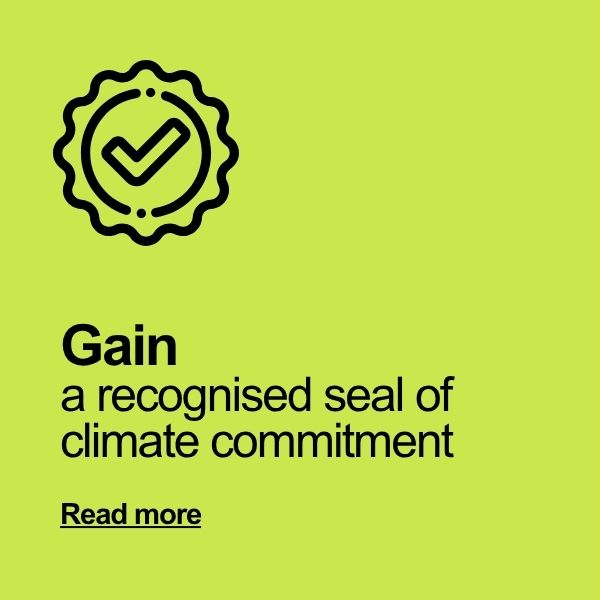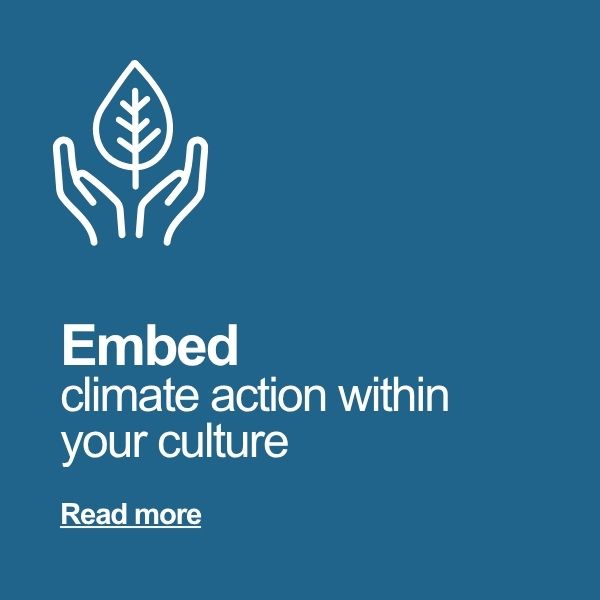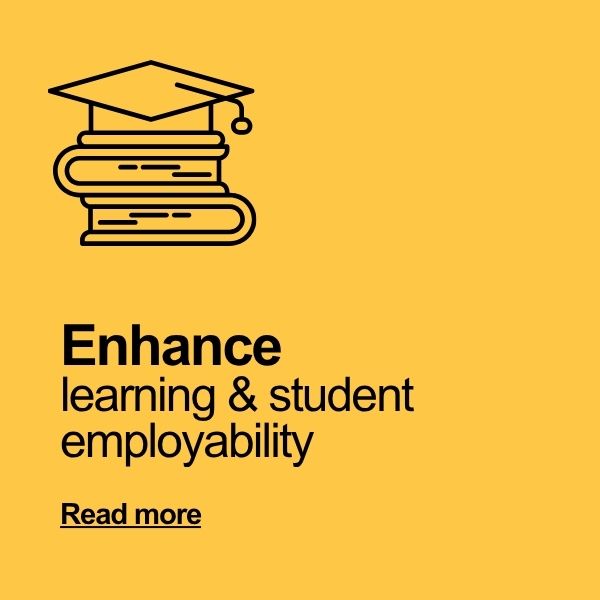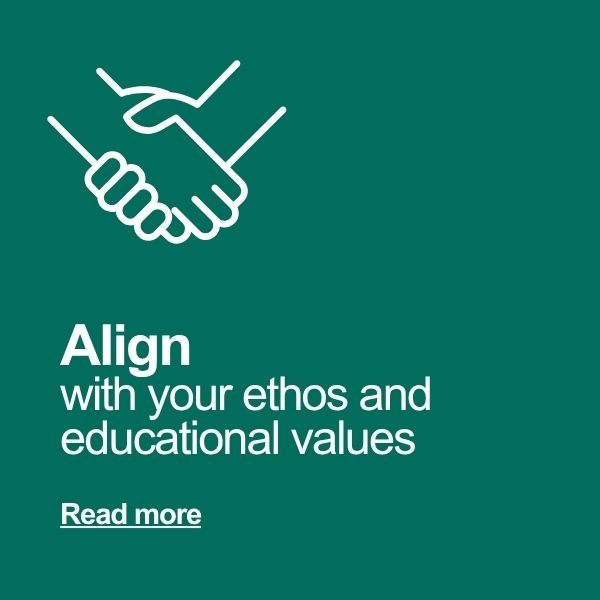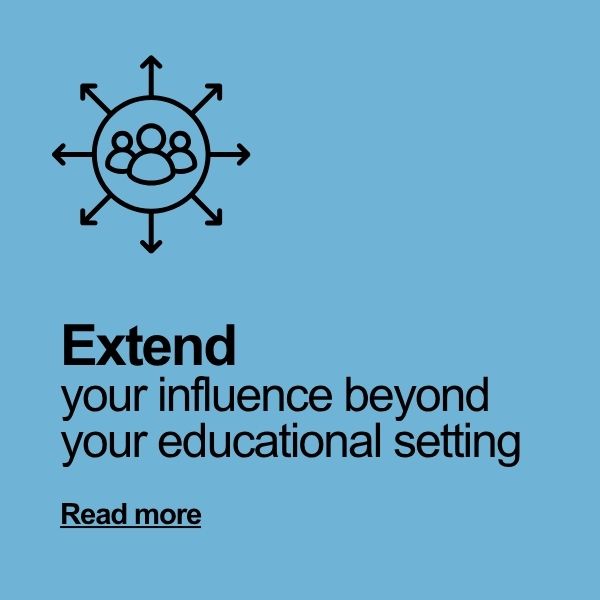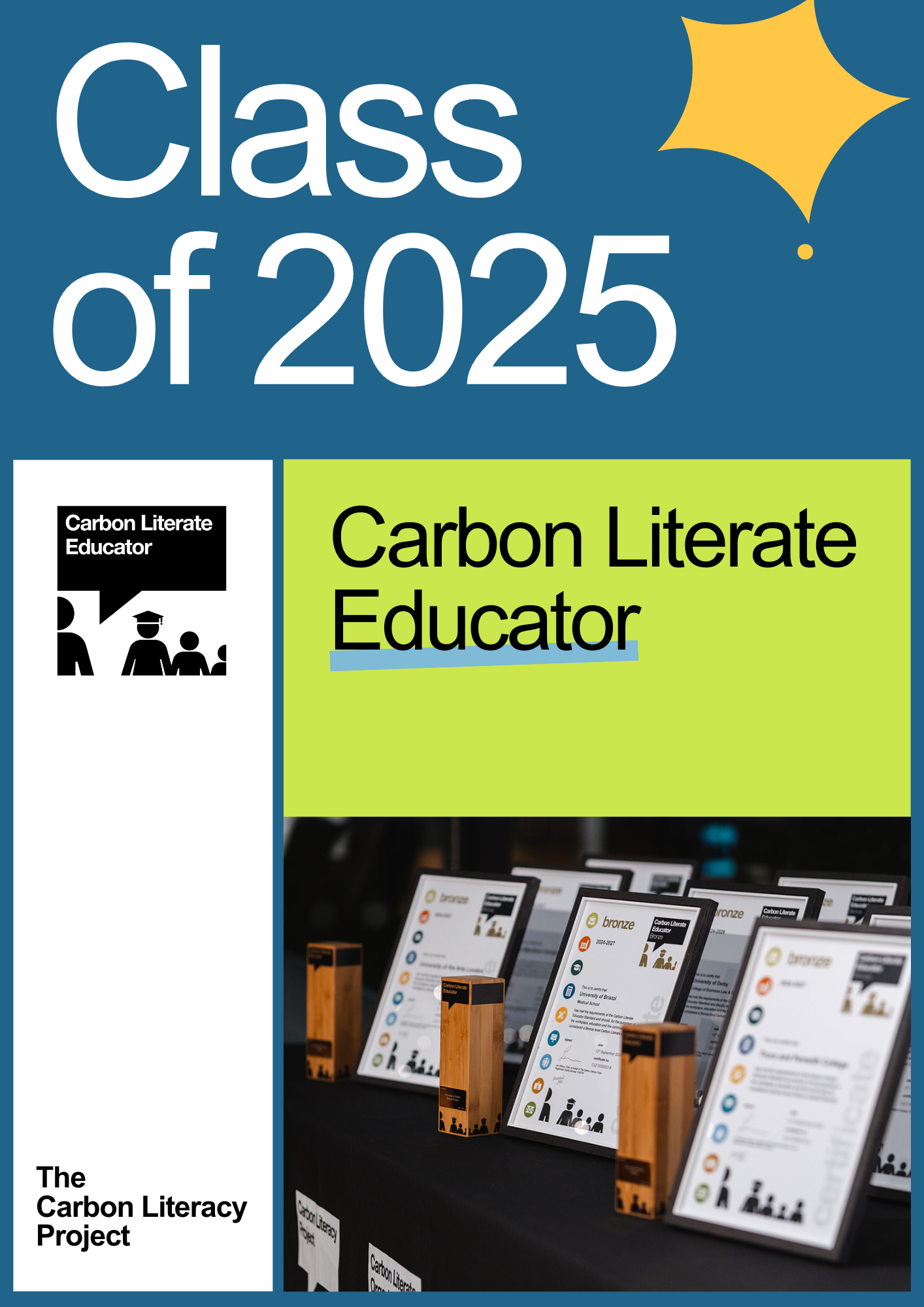Carbon Literate Educator
What is a Carbon Literate Educator?
A Carbon Literate Educator (CLE) is an educational institution which has been accredited by The Carbon Literacy Project as having substantial understanding of, commitment to and experience with Carbon Literacy®. ‘Educator’ in this context refers to any kind of formal educational context which has a population of taught students as part of its organisational body. CLE acts as a demonstration of progress towards a low-carbon culture resulting in reduced carbon emissions whilst systemically embedding climate education and action.
Carbon Literate Educator is the visible ‘badge’ which showcases an Educator as:
- Committed to Carbon Literacy
- Having a substantial number of Carbon Literate people
- Supporting its Carbon Literate staff and students whilst instilling and maintaining a low-carbon culture
- Positively utilising its influence in the community and wider world.
An Educator will use this status all the better to interact with its spheres of influence, from staff and students internally, to local communities and businesses externally. 
The CLE accreditation scheme has four levels: Bronze, Silver, Gold and Platinum. These reflect increasing levels of Carbon Literacy commitment and achievement by the Educator. Unlike the Carbon Literate Organisation (CLO) accreditation, there are fewer prescribed and more self-selecting options, enabling Educators to customise their CLE. This is to reflect the diversity of educational settings and offers a differentiated accreditation suited to an Educator’s unique context. This means that they can tailor the accreditation by committing to actions which showcase where they can have the most significant impact in accordance with their capacity.
Why Become a Carbon Literate Educator (CLE)
Joining the growing community of Carbon Literate Educators worldwide positions you alongside leading institutions in climate education and sustainable practice.
Getting accredited as a CLE is more than a credential, and more than a trophy and certificate; it is a strategic step toward embedding sustainability at the heart of education. It enables you to cultivate empowered learners, engage your wider community, and position your institution as a true climate leader.
CLE Awards 2026
The deadline for 2025 CLE accreditation has now passed. To make the deadline for the next wave of CLE accreditations and secure your trophy for 2026, you can complete and submit your application using the CLE Pack linked at the bottom of this page. This contains everything you’ll need to apply, including information on the fees and application criteria.
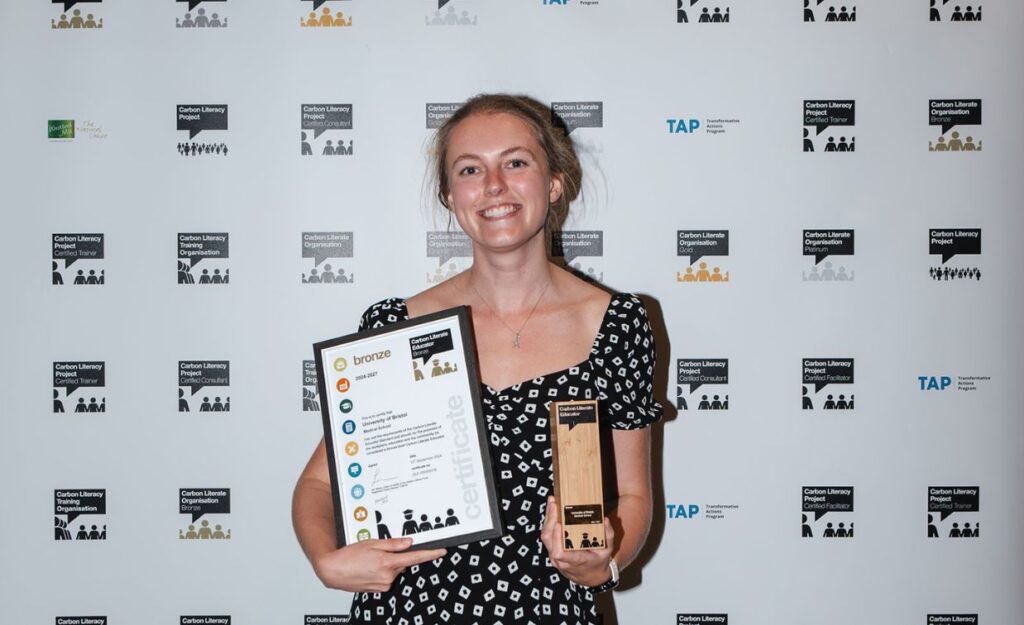
In 2025, we celebrated the second annual cohort of Carbon Literate Educators and their achievements in gaining CLE accreditation. This year saw two new milestones reached: the first school to achieve CLE status, and the first Gold level CLE.
Our 2025 cohort sees four universities, three colleges and one school achieving CLE accreditation across Bronze and Gold levels, situated across England, Scotland and Australia. These institutions have demonstrated their commitment to Carbon Literacy®, embedding a low-carbon culture and creating a positive shift among staff, students and the wider community.
Meet the CLE Class of 2025 here.
In October 2024, we held the first-ever Carbon Literate Educator Awards ceremony, where we celebrated the inaugural cohort of Carbon Literate Educators and their achievements in gaining CLE accreditation across Bronze and Silver levels.
Among this cohort are universities and colleges across the UK and Australia, all of whom displayed a substantial understanding of, and commitment to Carbon Literacy®, instilling climate action and a low-carbon culture, and positively using their influence in the community and wider world.
Meet the CLE Class of 2024 here.
"Very useful [training] and absolutely necessary in order to make changes both individually and at the institution."
Anna Arveschoug-Harby, Global Partnership Unit Program Administrator at Manchester Met University
“Some of the most important training I've ever done... I thought I knew about climate change, carbon reduction, and sustainability, I thought we were doing our bit, and then I went on a Carbon Literacy course. One day out of a busy diary, but boy did it make a massive difference. I was wrong on so many things that I thought I knew about."
Alice Webb, Director of BBC North
"We need to face up to this major challenge, partly because of the health and quality of life of our own residents. We want to clean up the air that they breathe, we want to reduce the use of plastic that's cluttering our rivers and our green spaces. We want to put Greater Manchester in a position of leadership on this crucial issue that will shape the 21st century, but if we are to succeed it does require radical action now."
Andy Burnham, Mayor of Greater Manchester
I gained my Carbon Literacy certificate while I was in Year 5! The reason we were able to achieve this award is because we answered 3 questions: What is climate change? What causes climate change? What can we do to stop climate change? We are really happy that we have possessed this knowledge because then we can pass this knowledge onto our parents and then our family and it would keep being passed down. Therefore we are helping to stop climate change!
Yasin Hamza Ali, Heald Place Primary School
“Our Carbon Literacy initiative has proven to be an incredibly effective way to empower staff and students to generate meaningful impact both individually and collectively. I am delighted by the enthusiasm and insight of all participants, and the many inspirational pledges submitted and subsequent impact generated."
Professor Steve Cayzer, Climate Action Learning and Teaching Liaison, University of Bath
“I was genuinely inspired by the passion and insight the students brought to the training. Their ideas and engagement give me real hope for the future. They’re already thinking like the sustainability leaders and innovators we’ll need in the years ahead. By earning their Carbon Literacy certification, they’ve taken a meaningful step toward understanding the challenges and opportunities of a changing world—skills that will serve them well, whatever path they choose.”
Daniel Cope, Director of Green Lark Environmental Solutions
“It was a really interesting course—some of the statistics were actually shocking! I enjoyed how it made you think about the impact we’re having on the climate and what steps we can take to help reduce carbon emissions.”
Lainie Whalley, Student, Sir Thomas Boughey Academy
"DBS is delighted to be recognised and certified as Bronze Carbon Literate, joining two other Australian business schools. This recognition is testament to the importance of Carbon Literacy training for staff and students at Deakin Business School, and our commitment to the Principles of Responsible Management Education – as a PRME Champion. Carbon Literacy training is a core component of our ambition to be a catalyst for positive change."
Professor Amanda Pyman, Dean of the Deakin Business School
"Becoming a Bronze Carbon Literate Educator is an important milestone for Royal Holloway. It shows our dedication to empowering our community to be sustainability champions. This training gives people the knowledge and confidence to make greener choices – both in their personal lives and in their careers."
Professor Sigrun Wagner, Royal Holloway, University of London
“Becoming the first educational institution in Scotland to achieve Bronze Carbon Literate Educator is an immensely proud moment for Fife College and an important step forward in our climate journey. This accreditation highlights the leadership role we’re playing in embedding sustainability at the heart of our work – from how we teach and operate, to how we empower our students and support our communities. “
Jim Metcalfe, Principal at Fife College
How to Apply
Interested in becoming a Carbon Literate Educator? To view our CLE Standard and complete the application process, please download the ‘Become a Carbon Literate Educator Pack’ below. Once you are ready to submit your application, please send all supporting documents to [email protected] where you can also ask any specific questions around the application process.
What to do if you haven’t started your Carbon Literacy journey yet:
If you haven’t yet started training your staff and students as Carbon Literate, you can contact us to discuss how you can do this. Email our Education team at [email protected]. Find out more about the training materials available to the Higher and Further Education and Schools sectors.
